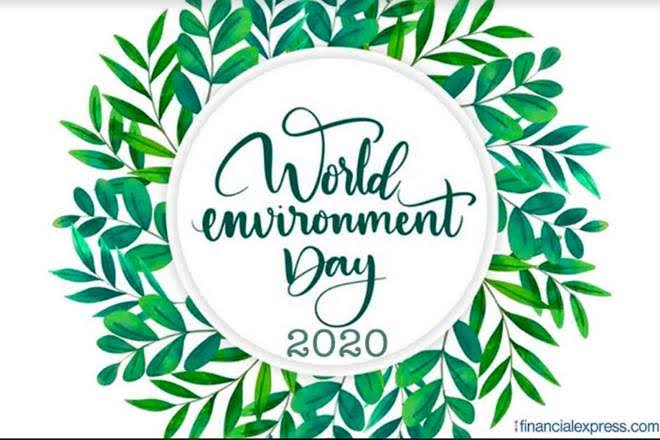The humongous toll of coronavirus on life and livelihood, has resonated the urgency for more stringent policies on environmental conservation.
Not doing so will be disastrous.
The pandemic has exposed the nexus between recent incidences of zoonotic diseases and colossal destruction of nature.
The imperative to arrest this devastation, which cumulatively endanger both humanity and the earth, through ‘biodiversity,’ is the focus of this year’s World Environment Day (WED).
With tremendous focus on the infection, called COVID-19, the occasion is being observed, with remarkable consternation.
Since its historic inception in 1974, by the United Nations General Assembly (UNGA) in Stockholm, Sweden, never has the annual event been so placid.
Spearheaded by United Nations Environment Programme (UNEP), the commemoration, is usually marked with enthusiasm in over 100 countries.
With the lock-down, to tame the epidemic, there is little to cheer, as mankind battles the raging catastrophe.
Despite the absence of convivial exhibitions, tree planting and other displays, the infection has exposed a more deadly climatic danger.
The diagnosis is pretty known. ‘Human activities have reduced biodiversity and modified wildlife population structures,’ spiralling cataclysmic consequences.
Hence environmentalists, in huge numbers, shifted their activism to the internet, to synergise forces against the ticking bomb.
Executive Director of UNEP, Inger Andersen, said ’75 percent of all emerging infectious diseases are zoonotic viruses, originating from animals.’
According to him, it calls for urgency and action to address the crisis by incorporating nature-based solutions into global climate action. ‘The health of people and our planet are intimately connected.’
‘Human activity has altered virtually every corner of our planet, from land to ocean. As we continue to relentlessly encroach on nature and degrade ecosystems, we endanger human health.’
‘Green investments, such as renewable energy, smart housing, green public procurement, public transport, should be guided by principles of sustainable production and consumption,’ he stressed.
This requires sound management of hazardous medical and chemical waste, strong and global stewardship of nature and biodiversity, as well as a clear commitment to creating green jobs and facilitating the transition to a carbon neutral future.’
Similarly Germany’s State Secretary for environment, Jochen Flasbarth said ‘we need to develop policies that stop extinction of plant and animal species.’
He said ‘climate action and biodiversity conservation are two sides of the same coin,’ hence the exigency to rebuild a more environmentally responsible world.
In the last 50 years, human population has doubled, according to UNEP chief. ‘The global economy has almost quadrupled and global trade has increased by approximately 10 times.’
With this exertion on bioresources, many species are at risk of extinction.
‘The more biodiverse an ecosystem is, the more difficult it is for one pathogen to spread rapidly or dominate. Depletion provides opportunity for pathogens to pass between animals and people,’ he noted.
‘Increasing deforestation, encroachment on wildlife habitats, intensified agriculture, and acceleration of climate change, have upset the delicate balance of nature.’
‘Today, it is estimated that, globally, about one billion cases of illnesses and millions of deaths occur every year from diseases caused by coronaviruses.’
Hence Colombia, a mega diverse country, is hosting this edition, along with Germany.
As a ‘megadiverse’ nation, situated in the Amazon rain forest, ‘it holds 10 percent of the planet’s biodiversity.’
‘Columbia ranks first in bird and orchid species diversity and second in plants, butterflies, freshwater fish and amphibians.’
“With 1 million species facing extinction, there has never been a more important time to focus on biodiversity.’
Anderson stated these in a joint paper with Flasbarth and Ricardo Lozano, Colombia’s Minister for Environment and Sustainable Development.
Biodiversity, comprising earth’s terrestrial, freshwater, marine species and their habitats, is vital to the survival of all life forms.
Within this interconnectivity, ecosystems rely on all parts from the smallest bacteria to the largest vertebrate.
With over 98 percent of species going extinct, the 2030 Agenda for Sustainable Development Goals (SDGs) seeks ‘lasting protection of the planet and its natural resources. Goals 14 and 15 focus on sustainable use of marine and terrestrial resources.’
READ ALSO: COVID-19: More Concerns Over Easing Of Lock-downs In Nigeria, Africa
Major factors affecting the planet include pollution, overpopulation, deforestation, climate change and global warming.
UN Deputy Secretary-General Amina Mohammed called for concerted action to reverse biodiversity loss, reduce pollution, as well as improve waste management.’
‘As the global population approaches 10 billion, nature is sending us a message,’ Andersen warned.
However this message is not resonating well across all segments of society, especially those living on the fringe.
Most impoverished populations, who exist at the lower end of the echelon, are lost in this discourse.
Sadly poverty is set to increase for the first time since 1998, due to COVID-19, according to president of UN Economic and Social Council (ECOSOC) Mona Juul.
Similarly, Anne-Birgitte Albrectsen, said ‘the poorest and most vulnerable have the right to help in shaping policy responses. The poorest really know the problems and should be consulted.’
But on the flip side, this seems herculean.
The task of advancing this philosophy, across classes and cultures is challenging.
Cultural proclivities, in parts of Africa and Asia often conflict with western-styled conservationist theories.
For instance, bush burning, tree felling and animal cruelty are still prevalent in Nigeria.
However environmental violations seem worse in China, with the ancient use of rare species, as both food and medicine, largely blamed for this pandemic.
United States (US)- based lawyer and environmentalist, Mr. Emeka Igboeli described it as calamitous.
‘The demand for elephant tusks and tiger derivatives is a major concern. Sadly China is party to the Convention on International Trade in Endangered Species (CITES) and proscribed zoonotic derivatives, in Traditional Chinese Medicine (TCM), yet poaching and illegal killing of animals are still rampant in the country,’ Igboeli stressed.
‘Excessive hunting of tiger for its medicinal values, is depleting and endangering its existence.’
These conflicts underscore the need to enlarge this initiative by embracing all people, whose actions and inactions invariably affect scant resources.
Most rural communities in Nigeria know little or nothing about deforestation, desertification, ozone layer or water pollution.
Some are too poor to mind such ideologies, due to struggles for basic necessities.
Juxtapose this with dumping of toxic materials, in poor countries, for a clearer picture of atrocious inequities globally.
The rich often swing public policies, while the poor are usually excluded.
Governments pay scant attention to this disadvantaged lot, who swarm, precariously, in squalid shanties, bereft of modern communication technologies.
This can be addressed by boosting infrastructural development in such places.
Without this intervention, the poor will continue to hack natural resources for firewood, charcoal and other domestic purposes.
Spurious exhibitions, undertaken by some government agencies and organizations at such occasions in Nigeria are preposterous.
Climatic issues are too weighty to be trivialized.
Poverty and exclusion are the real enemies of ecological viability.
Both should be considered in an inclusive and bottom-up approach for diversity and biodiversity.
.OJUKWU, a Hubert H. Humphrey alumnus and Lagos-based journalist writes via adeze.ojukwu@gmail.com











